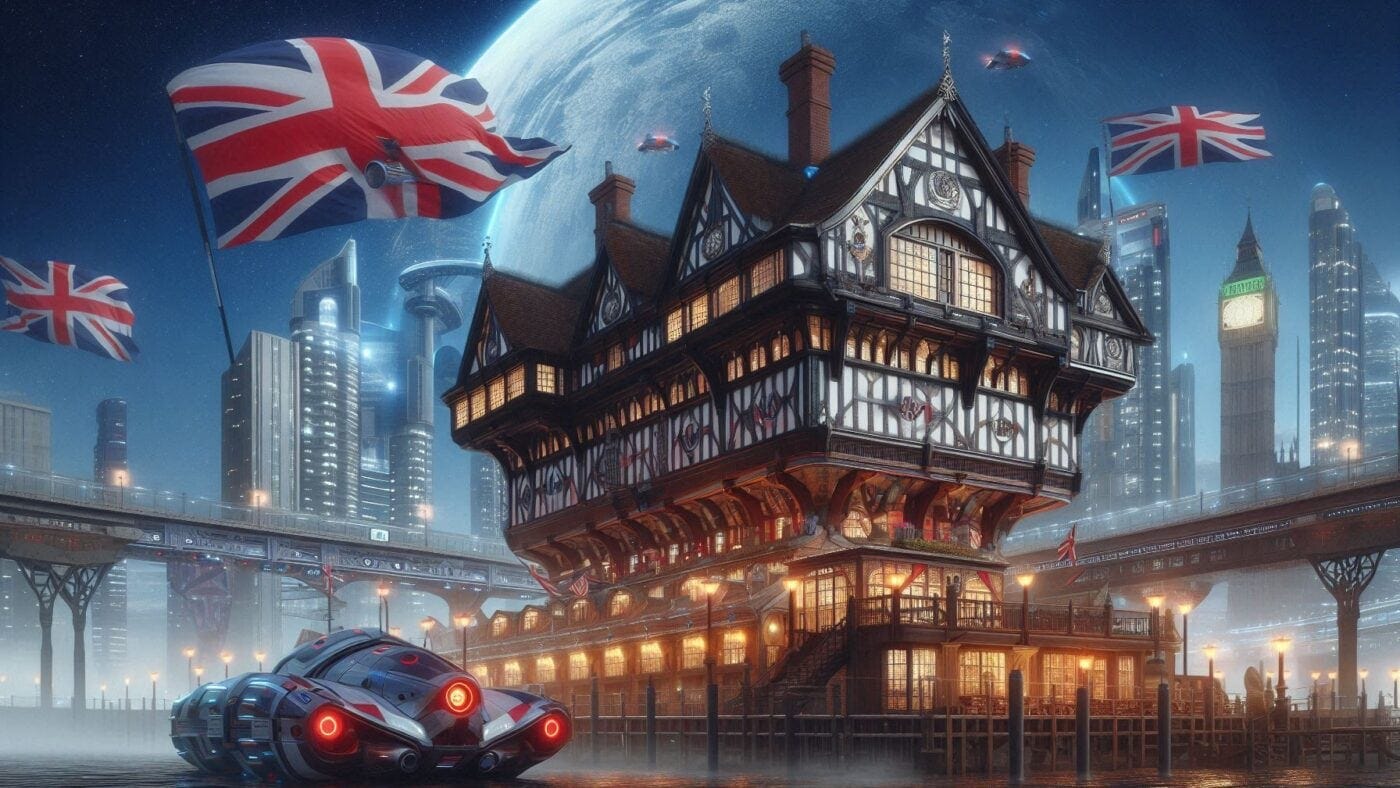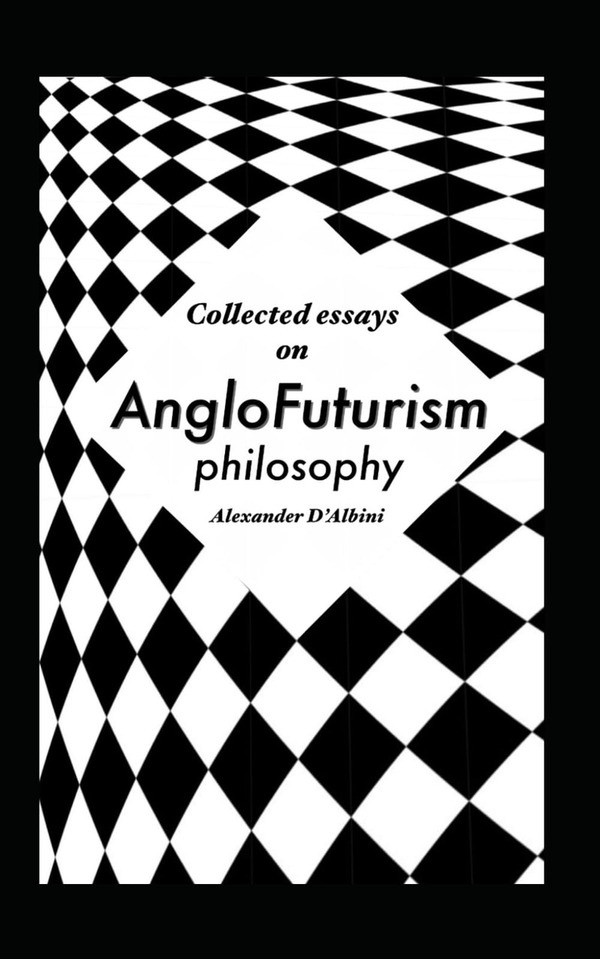On Anglo-Futurism
Does a fusion of English tradition and technological optimism offer a route for cultural renaissance or is it a dead end?
In Collected Essays on AngloFuturism Philosophy Alexander D’Albini sets out of the principles of the movement in a collection of essays written in the second half of 2024. Anglo-Futurism (AF) is the traditions of the Anglo people and the technology of futurism. The five pillars of AF are family, housing, order, technology and competency. D’Albini considers AF to be an antidote to “ten spectres of the Anglosphere”, which he identifies as Digital Addiction, Social Comparison, Cyber-Aggression, Overconsumption, Environmental Neglect, Isolation and Dehumanisation, Apathy, Cultural Erosion, Surveillance Overreach, and Technological Hubris.
This malaise was summarised in more concrete terms by Aris Roussinos in a 2022 article. “The fundamental problem facing Britain today is the collapse of this chosen model, the fruit of a previous, lesser era of crisis. Instead of shoring up the state’s resilience to the pressures of an increasingly unstable world, the reliance on market forces has left the Government increasingly unable to impose order, provide functioning healthcare, keep the lights on or put roofs over people’s heads: a state that cannot provide these basic functions is really no state at all.” The British state, paralysed by incompetent short-termism in the service of uniparty functionaries, is spiralling downwards in uncontrolled decline. What is needed for British potential to be unlocked is a revolutionary hyper-competent technocracy. “It is a country where cheap and reliable high-speed rail darts across the country, through the new towns where everyone who wants can have their own warm and spacious home, past the small family farms which provide the country’s food security. In the clean skies, electric airships move freight across the country.”
In his book D’Albini sets out the basic position of AF. “AngloFuturism is not socialist, not progressive, nor conservative, or nationalist. It is Anglo.” As D’Albini’s definition of Anglo means of the culture of the people who came from the British Isles – so that it can include not just Great Britain but the former colonies of the USA, Canada, Australia and New Zealand – he cannot say that English or British nationalism is the priority, as this would relegate the Anglo diaspora to secondary status and complicate the aims of AF. Anglo ethnos is fairly easy to define, although the edges may be fuzzy. We can straightforwardly describe the ethnic English as descendants of the ancient British peoples, plus Romans, Angles, Saxons, Normans and Vikings.
The definition of AF’s “Anglo” is not ethnically British and born in Great Britain but rather what Anglos decide is part of their Anglo tribe; this may (or may not) include British/English ancestry but should not include everyone of that ethnos; this is because (according to AF) Anglo is ethos as well as ethnos. “The ‘spirit of the Anglo’ is the defining criteria to being an Anglo.” What is “the spirit of the Anglo”? D’Albini nominates respect for tradition, collective wisdom, common sense, optimism, inventiveness, moderation, practicality and spirituality. The author has a Christian faith and sees its importance for Anglo society but he does not specify Christianity as a bedrock for a revived Great Britain. Communitarian spirit is a necessity, writes D’Albini.
AF rejects ethno-nationalism because not all ethnically associated people share Anglo values, whereas ethnically non-Anglo people may share Anglo values. D’Albini suggests that Anglos are not self-defined, yet he adds “anyone can align with Anglo culture as long as they embody its Spirit.”[vi] That seems a circular definition: an Anglo (or Anglo ally) is someone who defines himself as Anglo. It is also problematic. D’Albini writes that an ethnic Anglo who denies his culture can be treated as non-Anglo, which could give rise to the situation of a first-generation Indian admonishing an ethnic Englishman that it is he, the Indian, who is the truer Anglo.
A century ago the definition of “Anglo” would have been born of old English stock, Christian (devout or nominal), English speaking, martial, suspicious of the foreigner and devoted to king, country, God and family. It would have been not primarily a matter of choice but one of birth. This has been completely inverted, so that today a British person is defined by “modern British values”, which are multiculturalism, cosmopolitanism, individualism, democracy and tolerance; most importantly, it means ascribing to such values, regardless of one’s religion, ethnicity, language and place of origin. In other words, for the British state “a British subject” means anyone who complies with the state’s values and has British residency (not even citizenship); “Anglo” is an anachronism, with distasteful undertones. AF eschews “modern British values” but it fights shy of embracing the older definition, noting that touchstones change over time. D’Albini claims AF is not civic-nationalism, as civic-nationalism is top-down, state-imposed and “too abstract”. Yet I am unpersuaded that in either theoretical or practical terms AF is distinguishable from civic-nationalism.
NF is particularist in that it favours the domestic over the foreign and clearly supports the drive to discriminate on the basis of national self-interest. This suggests it is aligned with the insights of elite theory. On the other hand, D’Albini’s AF advocates a form of governance based upon the English disposition towards operating in small co-operative units based on clans, guilds and villages. Although this might lend itself to feudalism, D’Albini suggests that for Anglos democracy is both possible and admirable, something at odds with elite-theory insight, which states oligarchy is the natural form of all governance in developed societies. Democracy is used as a veil to conceal from the population the true nature of power, which is top down. D’Albini has written elsewhere that he is supportive of the principle of monarchy. American NF appears a lot more open to autocracy and less wedded to democracy.
AF is avowedly “non-political and non-nationalist” and accepts “Anglo ethos” in toto, so it cannot help but seem technical and aesthetic in nature. The unofficial symbol of AF is the red squirrel, which represents native British inhabitants. This is implicitly counterposed with the immigrant grey squirrel population, which has almost entirely displaced the native species in many places in mainland Britain. Contrast the AF red squirrel with the American NF’s eclectic preferences for Roman statuary, punk imagery, Goth aesthetics and neon graphics. While the cottage is commonplace in AF memes, Americans eschew the log cabin, instead adopting the space rocket. The aesthetic difference is telling. AF is (despite AFs’ protestations) pastoral and backwards looking; American NF is metropolitan and forwards looking. National character shines through in the two NFs’ imagery.
Nationalists would conclude that to save the Anglo project it is necessary to save the Anglo ethnos. AF’s reluctance to address this betrays liberalist priors. Anything that liberals might consider taboo has not been broached by AF. My question to AFs is – aside from questions of values – how serious are you about protecting Anglo people? Any group in a territory will be surrounded by competitor nations and supra-national organisations intent on implementing globalisation. So, what is the response of AF, other than navigating to the best advantage of the Anglo people on an issue-by-issue basis? Without assertive nationalism to defend the homeland and prevent subversion, how can AFs achieve any of their goals?
Do AFs think Anglo values can survive the absence of the Anglo people? If so, then the Anglo population is superfluous and globalism can be adjusted to reflect the Anglo-cultural memeplex without the existence of the Anglo population. If not, then is AF willing to advocate strong measures to protect the Anglo ethnos?
If AF has a future it needs to become bolder and more emotional. Anglo compromise and politeness has contributed to the parlous state of Great Britain. AF’s determinedly apolitical position means it is not well situated as a vehicle for social defence, which would require base emotions to motivate discrete campaigns on specific issues. AF gives inspiration and purpose and suggests areas for improvement, but expects technology to provide the tools necessary for solutions and for others to direct the action. I understand that if the AF writers see themselves as thinkers and inspirers, they would be reluctant to commit themselves to setting out a political platform. (By disavowing politics, they have ruled themselves out of policy setting.) Therein lies the problem. By taking us to the point of policy formation and then handing over responsibility to others, AF followers will inevitably drift towards existing wings of the uniparty that have already demonstrated their inadequacy. In saying AF is a platform which any political party can adopt, AFs allow their vision to be deceptively appropriated by pre-existing organisations which caused the very problems AF opposes.
On balance, AF is a creditable project but I fear that new technology, good will and “British values” may not take us far as the advocates of Anglo-Futurism hope.
Alexander D’Albini, Collected Essays on AngloFuturism Philosophy, self-published, Great Britain, December 2024, paperback
Aris Roussinos, “It’s Time for Anglofuturism”, UnHerd, 29 August 2022



Alexander, in case you haven't seen this, here's something you might very well be interested in, although he seems to be aiming more at video or musical production. He is a writer though, and recently published his first novel.
https://marsreview.org/p/how-to-escape-the-coming-tide-of?utm_source=post-email-title&publication_id=1255696&post_id=168018153&utm_campaign=email-post-title&isFreemail=true&r=ho8ar&triedRedirect=true&utm_medium=email